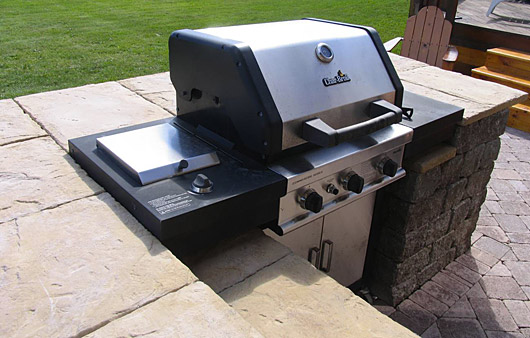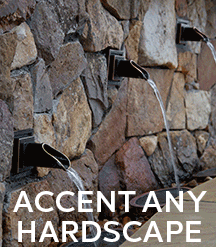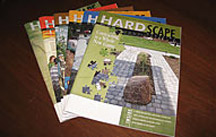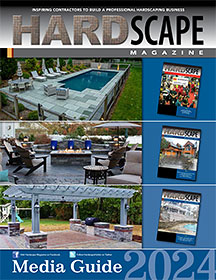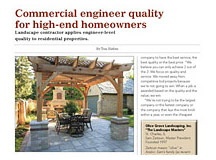Contractor Stories
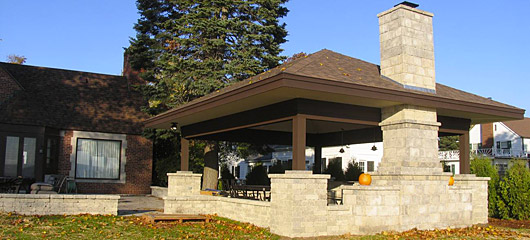
Planning to retire from a 1-crew company
Gary Buckpitt trains and retains capable employees to run things when he’s away, and when he retires.
By Tom HatlenGary Buckpitt works in the field on his only crew every day. But at 63 years old, he’s getting ready to retire. Unlike many small companies, the business won’t end when he’s done. He’s built something he can sell, and which will continue to provide for employees’ families after he leaves.
Though he works on the crew, he says he hasn’t been the crew leader for about 8 years. “Even though I’m on site, my foreman Doug Mason runs the project. There’s some times during the day that I’m not there. I work with them usually up to 1pm or 2pm, then I leave to do mowing, admin work and things.”
Gary’s been sharing management duties with both Doug Mason and Gary’s brother Doug Buckpitt the last several years. The plan is for them to buy the company when Gary retires in the next 3 years. Gary wants to go part-time in 2 years.
Training people to run operations also solved a major risk for Gary as a small business owner. If Gary got hurt, the business could function without him and his income would continue for his family.
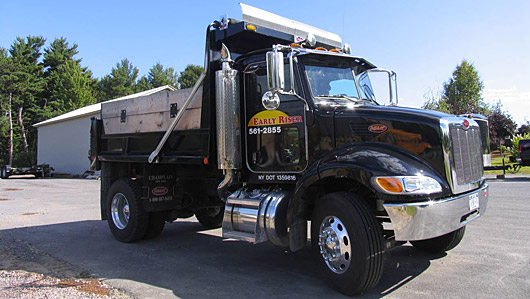
Adam has 2 dump trucks, the 36,500 GVW Peterbilt pictured and a 26,000 GVW Ford. He explains, “The majority of our jobs take at least 10 tons of aggregate for the base. With the big truck I can haul all of it at 1 time. It would take 3-1/2 trips with the small one. A lot of times I wish I had a 3rd dump truck.”
Dougs
Gary says Doug B. has been doing the vast majority of the sales for many years. Doug B. also takes on foreman duties about twice a week when they split into 2 crews to do small jobs.Doug M., in addition to leading the crew, is focusing on learning more about management. Gary says, “One of our goals is to have him much more involved with all aspects of running the business. We talk several times a week, and he gets it.”
Gary has had no ego problem making the transition to crewman. He says it just made more sense to have someone leading the job who was going to be on site all day, and who wouldn’t have the phone calls and distractions an owner has.
“For me, it was finding the right person who’s as meticulous as I am. And he’s probably more meticulous. We communicate, and we’ll talk if I see something I’m not liking or if I have some questions.”
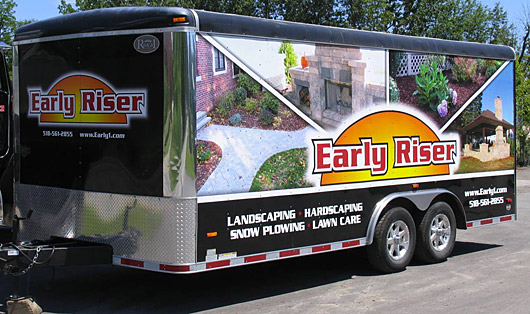
Adam’s 20’ hardscape trailer displays photos of their work. So, does it generate any calls? “Absolutely. Sometimes it’s ‘I saw your trailer on the highway and the photos. Do you do pavers?’ Or, ‘Do you do landscaping?’”
No room to grow
Gary says he’s kept the company small because his community is small and not near a major metro area. “At one time I had 2 more people working in the field. We just couldn’t get enough work to keep everybody busy.”They will travel further for large jobs, but Gary says, “The last couple years I’ve limited the traveling because once all the numbers are crunched, you’re not making enough to travel an hour each way. Diesel fuel here in New York is expensive, and it adds up quick.”
They do a lot of hardscape jobs in the 1,200 sf to 1,800 sf range. Gary says, “It’s really tough to be profitable on the smaller jobs. For the jobs in the 150 sf range to be profitable, it can be as high as $26 or $27 per sf with mobilization costs, drive time there and back, fuel costs.”
Scheduling small jobs can be a real trick. They reduce mobilization costs by scheduling small jobs near other jobs. Since they split their people into 2 crews for these jobs, they need small-crew work scheduled for both crews at the same time.
PROFILE
Early Riser, LLC
Plattsburgh, NYFounded 1991
Gary Buckpitt, President
Customer base
60% Residential40% Commercial
Services
31% Hardscape21% Landscape
20% Maintenance
18% Snow
7% Design
3% Hardscape lighting
Annual sales
2014 $700,000Largest project
$106,000Employees
42 companies combine for big jobs
About twice a year for really big jobs, Gary combines his crew with his son Adam’s crew. Adam Buckpitt started out by working in his father’s business and now runs the Set in Stone Hardscapes company a little over an hour away in St. Albans, VT.“Sometimes if you’ve got a job that’s going to last 3 or 4 weeks, you’re better off to get it down to 2 weeks. So, we all get together and it’s like having a team reunion. We know what each other is thinking. We have a few laughs and get after it, and we both make some money. Then it’s pizza and wings on Friday!”
Keeping people in a small company
The idea of transferring company ownership only came about a few years ago. Yet, Gary has been able to keep his 2 foreman-level employees over 8 years. One of his crewmen has also been there that long while the other came on board about 14 months ago.Why do they stay?
- Year-round employment – enough guaranteed snow/ice contracts to cover winter paychecks.
- Wages from $680 to $800 weekly – even when not working – plus 1 to 2 weeks vacation and annual bonuses.
- Commitment to training and involving employees in the company.
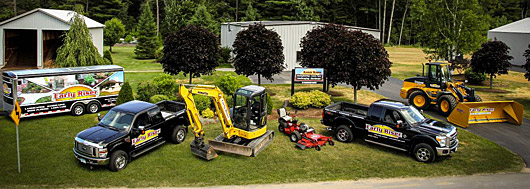
Gary runs 2 compact wheel loaders in addition to the large wheel loader pictured. No skid steer loaders. The large wheel loader is used primarily for snow removal. One of the small ones is usually out on an installation job while the other stays back at his nursery loading trees, mulch and everything else. Wheel loaders are more pricey, but Gary says they rarely breakdown, they don’t tear up turf and they’re extremely efficient. Even his compact wheel loaders have lifting capacities of about 9,000 lbs.
Gary says he’s able to pay what he does because his well-trained crew is that much more productive enabling him to win the larger, more profitable jobs. Everyone on the crew has at least the basic ICPI residential installer certification. Doug M. has NCMA basic certification too. Gary has 4 different ICPI and NCMA certifications. In addition to taking courses locally, most years different employees travel to Hardscape North America for seminars.
“The more our people know how to do things, the more efficient we become, and the more profitable we become. I want to do things to industry standards all the time. Shortcuts will come back and haunt you down the road.”
Since everyone on the crew is a trained expert, they all respect one another on the job. This makes it easier to understand how Gary could pass on foreman duties to someone else.
Snow income guaranteed
Gary has built his snow and ice management service into an important revenue center averaging about $180,000 annually. What if there’s no snow? Doesn’t matter. He has enough guaranteed contracts to cover payroll over the winter.Clients commit to paying a guaranteed minimum amount each year so they can be sure he’ll be there when they need him. Nearly all are corporate clients who understand there is a significant cost to have the equipment, salt and manpower available when they need it.
The client’s cost goes up once Gary’s hours go over a minimum threshold. Gary says last winter they had a lot of ice and $225,000 in sales. “We normally go thru 50 to 60 tons of salt. Last winter we went thru 140 tons.”
“If we’re not plowing or doing maintenance on our equipment, the guys have time off but they still get paid the same. A lot of people disagree with that method, but it works very well for us. My guys are extremely happy because they know they’re going to have some downtime to do some things they want to do.”
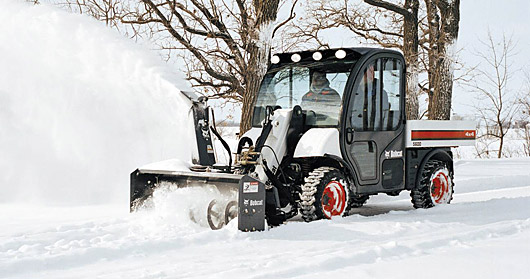
Gary has a Bobcat Toolcat utility vehicle similar to the one pictured. They use it to run a snow blower, a loader bucket, an auger and for towing since it has a 3-point hitch.
Mowing secures hardscape work
Gary’s maintenance clients are also his snow removal clients. He does the mowing himself because he likes it. Mowing offers a couple hours a day of quiet time away from the constant demands on an owner. But he only takes accounts that will also want installation work every year or 2, and that want intensive maintenance throughout the growing season. All but 2 of his 31 accounts are commercial clients and most are within 2 miles of his shop. With a 90% retention rate, snow/ maintenance clients provide steady income year after year.Gary also has a retail/wholesale nursery/hardscape dealership tended to by his wife, MaryAnn, who also answers the phone and schedules appointments.
Even with retirement in sight Gary is working on the final stages of his MBA. And, he’s planning to take the ICPI permeable paver certification class in the near future. He says, “The MBA was a personal goal of mine that had been delayed for years. But, I believe in continual education. That’s why I send all of our guys to HNA. You have to stay up with the changing times.”
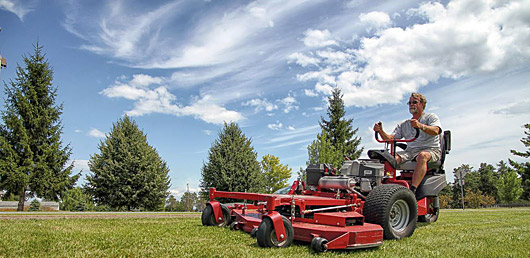
Gary reserves the task of mowing for himself so he can spend a couple hours of quiet time away from the constant demands on an owner.
